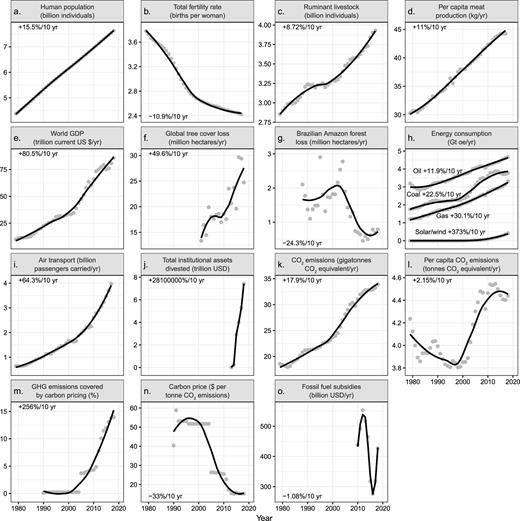Newsflash: “profoundly troubling signs from human activities”
Nov 15th, 2019 | By admin | Category: Climate ChangeBy Suzanne York.
![[Photo credit: Creative Commons]](http://populationgrowth.org/wp-content/uploads/2019/11/haze-in-Kuala-Lampur-1024x768.jpg)
Air pollution in Kuala Lampur, Malaysia [Photo credit: Creative Commons]
The scientists’ alarm was first sounded 40 years ago and in most years since then. But too many people have been blithely ignorant or simply choosing to ignore the signs. Yet it should be pretty obvious that we are way past disregarding warnings. We are, according to the scientists, inflicting “untold suffering due to the climate crisis” to Earth’s inhabitants, and they are shouting to the rafters that there is no time to lose.
We Have a Climate Emergency
The statement, a collaboration of dozens of scientists and endorsed, as noted above, by an additional 11,000 from 153 nations, includes a number of urgently needed actions to take for a thriving planet.
Known as the Alliance of World Scientists, their statement of alarm stands out for two reasons though – for finally mentioning the impact of human population growth and raising the problems with pushing GDP growth on a planet with finite resources.
This is what was written about why population growth must be addressed:
Still increasing by roughly 80 million people per year, or more than 200,000 per day (figure 1a–b), the world population must be stabilized—and, ideally, gradually reduced—within a framework that ensures social integrity. There are proven and effective policies that strengthen human rights while lowering fertility rates and lessening the impacts of population growth on GHG emissions and biodiversity loss. These policies make family-planning services available to all people, remove barriers to their access and achieve full gender equity, including primary and secondary education as a global norm for all, especially girls and young women.
Here is the point about economic growth:
Excessive extraction of materials and overexploitation of ecosystems, driven by economic growth, must be quickly curtailed to maintain long-term sustainability of the biosphere. We need a carbon-free economy that explicitly addresses human dependence on the biosphere and policies that guide economic decisions accordingly. Our goals need to shift from GDP growth and the pursuit of affluence toward sustaining ecosystems and improving human well-being by prioritizing basic needs and reducing inequality.
The graph below lays out the current situation:
The signatories do emphasize that the “climate crisis is closely linked to excessive consumption of the wealthy lifestyle. Economic and population growth are among the most important drivers of increases in CO2 emissions from fossil fuel combustion.”
Momentum for a Call to Action
It’s encouraging, at this 11th hour, that population impacts are finally being included in statements such as this, and that effective solutions like family planning are being promulgated. Solutions to change and reduce consumption and pursue alternative economies must be included, as the scientists clearly acknowledge. However, it is far easier to make sure that women have full access to voluntary, free and effective methods of contraception than it is to reduce consumption. The UN reportsthat more than 230 million women want to prevent pregnancy but are not using modern contraception. Meeting this need is an obvious effort to undertake.
Sadly, especially in the United States, policies that help women and the environment are being rolled back. Case in point – the U.S. has halted funding for the United Nations Population Fund (UNFPA), which works in more than 150 countries to increase access to contraceptives and provide emergency maternal and reproductive health services, amongst other things. And on the climate front, the U.S. has officially pulled out of the Paris climate agreement.
Perhaps with 11,000 scientists and many more raising their voices on the need to reverse course, more people will hear and understand the crises facing our world, and make their own calls to action.
Humans are part of the web of life. Regarding population and consumption/unsustainable economic growth, we have to address both for the sake of human and planetary health. We need access to voluntary family planning and reproductive health services, an end to child marriage, support for women’s rights and human rights, provide education for girls and boys, reduce unsustainable and inequitable consumption, acknowledge rights for nature, and focus on alternative economies that actually provide benefits to local communities. Then, maybe someday we’ll have a world in balance for both people and nature.
Or to take from the scientists’ warning – “To secure a sustainable future, we must change how we live.”
Suzanne York is Director of Transition Earth.

